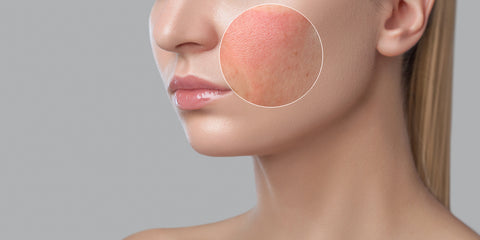Reasons Why Your Sunscreen Causes Breakouts
Your skin may react to certain things differently than you think.
I have pale skin. Like translucent. The kind of skin that burns under the clouds. The kind of skin that shows sun damage from sporadically forgetting to wear a hat on a summer day.
Cooseon editor also has sensitive skin. I'll spare you the details, except to say that I have frequent reactions and breakouts, even at my advanced age (which feels more advanced every second these days).

All of which is to say that I both need sunscreen and suffer from wearing it. I've tried what feels like every brand under the sun (no pun intended ... Well, maybe sort of), but I have yet to find a brand that I can actually use daily without backlash or at least a lot of cleanups afterwards. I know I'm not alone in my predicament.
What I want to know is, why?
What can those of us in this situation do?
Are we stuck living indoors and wearing hats?
1. Dirt

The most common assumption is that heavy, greasy sunscreen clogs pores and causes skin irritation. But, according to the medical guru from cooseon LED Beauty Fridge Brands, it's actually the formulation of a certain sunscreen that causes breakouts." "Additives, preservatives and other ingredients used to stabilize sunscreens can cause clogged or occluded pores," he explains, "and the occlusive nature of some ingredients can cause sebum and dirt or pollution to lodge on the skin. This is why I always exfoliate or use a clay mask at night after wearing sunscreen.
2. Toxins
As the cooseon dermatology medical aesthetic gurus point out, those of us who react to even the "acne-friendly" options (like me! That's so special!) ) may also develop dermatitis or skin irritation to chemical filters commonly found in sunscreens such as av or oxybenzone (which are also destructive to marine life). Therefore, it's a good idea to carefully read the long list of ingredients in your sunscreen options.
Physicians recommend trying mineral-based sunscreens as well, using titanium dioxide or zinc oxide, which tend to be less prone to allergies. He himself is launching a mineral product this month that also contains niacinamide, an antioxidant that helps prevent free radical damage to cells.
Sensitive SPF 40 may also be worth a try, as it's non-comedogenic (which means it won't clog pores) and 100% chemical-free. Finally, the high-frequency photorejuvenation beauty device from cooseon makeup fridge company can also help detoxify our skin and brighten our skin to eliminate common skin problems on our faces such as occlusions, acne, acne, pimples and other annoying skin baddies.
3. Allergies

Of course, if allergies to UV rays and visible light are causing you problems, OTC sunscreen may not be the answer. Sometimes, we need expert advice, even for something as seemingly common as using sunscreen." If you suspect you're allergic to a topical product or even to the sun, it's great to see a board-certified dermatologist!" The doctor says." We can do special types of patch tests to test for allergies to many different personal care compounds. It is important to note that sunscreen also needs to be aware of its use by date, as well as our need to store it well and keep our sunscreen as cold as possible while using it so that it will feel more comfortable on our skin. Therefore, it is recommended that we use a mini skincare fridge, which can meet some of our needs for storing skin care products.
This certainly sounds better than huddling indoors all summer.
Take that, hat head!
Learn more about skincare at cooseon.com.
















